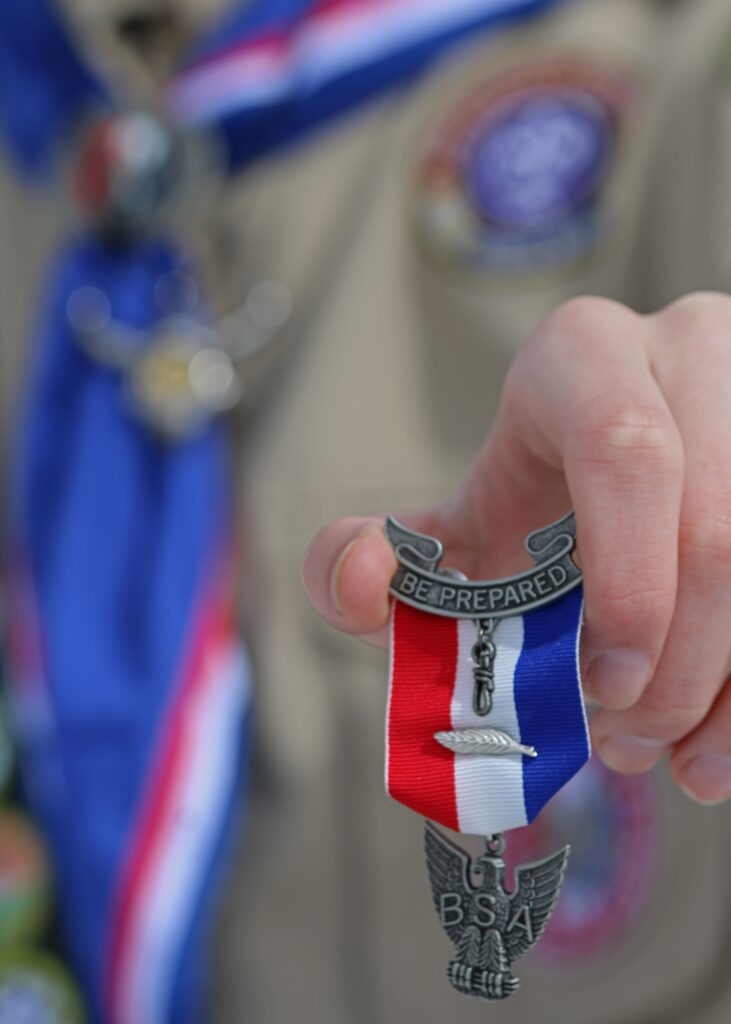The Eagle Scouts are an old and venerable institution, one with a long history in the US. There are direct benefits to participation of course, and some secondary ones as well. One notable one which is not often discussed are the Eagle Scouting scholarships, funds which exist solely for those scouts who have achieved this high rank. In this article, we’re going to look at Eagle Scouting in the context of college admissions; how it can help your candidacy, and how these scholarships can help you afford the increasingly high cost of a college education. Now that scouting is open to girls and boys alike, this is a niche but useful way to improve your candidacy, and possibly to help defray the costs of college. Let’s jump right in!
Eagle Scouting and Candidacy Building
The rank of Eagle Scout is the highest rank in scouting (Boy Scouts of America changed their name in 2025 to Scouting America, as they are now allowing girls to join as well. While boys and girls are in separate troops, the organization is now fully coed, and all students have the same requirements and opportunities within the organization). This is a very selective rank, and requires a significant time devotion to scouting; approximately 4% of all scouts end up attaining the rank of Eagle.
Becoming an Eagle Scout requires the following:
- You must have been a scout in good standing for at least six months
- You must have earned at least 21 merit badges (14 of which are mandatory to become an Eagle)
- You must have demonstrated the qualities expected of a scout, especially leadership in your troop
- You must complete an Eagle Project (more on that later)
All of these requirements must be completed before your 18th birthday. Once they are done, a review board is convened to determine your candidacy; and they decide whether or not you have attained the rank of Eagle scout. Being an Eagle is notable in that it is one of the few achievements you can win in high school that you can continue legitimately putting on your resume much later in life, and still have an impact. It isn’t unique in this, but it is one oft overlooked benefit of becoming an Eagle scout.
Being an Eagle is not going to get you into a top college in and of itself; it is a somewhat exclusive coterie, but there are still thousands of Eagle Scouts in the US. Much more useful are the things you must do to become an Eagle; demonstrating leadership, consistent work towards a goal, serving your community and demonstrating your values; all of these are traits colleges look for when evaluating students. And then, there’s the Eagle Project.
Eagle Projects and College Admissions
Every other requirement for Eagle Scout is qualification; you must meet these specific benchmarks to show that you have the caliber of character they are looking for in an Eagle. It is the Eagle project that really determines whether or not you make the cut, and what separates Eagle Scouts from their peers.
Technically known as the Eagle Scout Service Project, it has the following criteria, according to the Scouts Handbook:
- While a Life Scout, plan, develop, and give leadership to others in a service project helpful to any religious institution, any school, or your community. (The project must benefit an organization other than the Boy Scouts of America.) A project proposal must be approved by the organization benefiting from the effort, your Scoutmaster and unit committee, and the council or district before you start. You must use the Eagle Scout Service Project Workbook, in meeting this requirement.
This is intentionally very broad, though there are a few other requirements. This cannot be a commercial venture, nor can it simply involve fundraising. This project must involve something tangible and real, and lead to the scout getting their hands dirty (be that literally or metaphorically), in the weeds of it.
As an example, in the town where I live, there is a rather nice park with some hiking trails. Nothing grand or extensive, but a few miles through a nature reserve, a good walk on a nice day. There are several maps of the trails throughout the course of them, showing where they intersect and the routes they take; these were created as an Eagle project, as a small plaque on them will tell you, some ten years ago now.
This is not a world-changing project, not curing cancer or going to the stars, but it’s a tangible and definite benefit to the scout’s community, making things that much better for people in a small but real way. This is the kind of project many scouts complete, an incremental step in making the lives and community around them better through their own effort.
In many ways, these exactly parallel what colleges want to see form a capstone achievement in high school. This is something of your own design, brought forth by your effort, and with a noticeable impact on a community you are part of. As with all capstone projects, it both shows off the bounds of your accomplishments, and what you value and hold dear.
On top of this, being an Eagle provides a lot of really good material for writing your essays. Colleges often ask about how you’ve shown leadership abilities, or contributed to your community, or a passion project you’re completed, and Eagle Scouts have material for this in spades.
Eagle Scout Scholarships
The National Eagle Scout Association offers a number of scholarships which are set aside specifically for Eagle Scouts. Note that Eagle scouts are not required to join NESA, but it is a requirement to apply for these scholarships. There are numerous scholarships, each of which has its own criteria to apply for, and each with differing aid amounts.
The scholarships as a whole do share a single application, which can be found on NESA’s website. In addition, while some scholarships have additional eligibility requirements, they do all share some core ones. These are the eligibility factors all applicants need to have:
- You must be an Eagle Scout, and a member of NESA
- You must be between your senior year of high school and your junior year of an undergraduate program, or the halfway point of an associates degree or trade program
- All scholarships are one time awards, and you may only ever receive a single NESA scholarship
- You must be enrolled or accepted into an accredited program as a full time student, either a terminal degree program or a trade school
- These scholarships are not available to any students attending a military academy, or to students pursuing graduate or masters degrees
They are looking to award scholarships to scouts who are active participants in both scouting, and in their local communities. Since both of those are generally requirements to become an Eagle already, this is not terribly surprising. In 2024, they received slightly over 4,300 applications and awarded 69 scholarships.
There are a variety of scholarships; some of these have need-based components, others are purely merit based. Since they all have a single application, you can apply for all of these at once. Applications open December 1, and are due by the end of January. Once an application is started, you will be sent an email, this is how you will be able to submit application materials.
The application requires personal information, transcripts, letters of recommendation, and essays. The essays in particular are extremely important, and are a major component in who ends up getting awarded these scholarships. Academic performance is always important too of course, but it is the essays that make the difference in the end.
They do give one note, that writing about your Eagle project may not be the best topic. While it works great for college essays, in this applicant pool, everyone has completed an Eagle project. They recommend looking for something else you have done, which may set you apart more (even if it still scouting related).
NESA offers a variety of scholarships, ranging from a few thousand dollars up to $50,000. These are all one-time awards, but are often disbursed over a period of time, some amount for each year of education.
Are Eagle Scout Scholarships a Good Option for You?
If you’re already involved in scouting, then yes, definitely. The odds can be long, but the experience of scouting itself can be quite valuable for college admissions on its own, even without the scholarship. Of course, taking part in scouting can be a serious commitment, one students often begin quite young.
This leads to a question for younger students: whether or not getting involved in scouting is a good choice, and a good use of time. As is so often the case when evaluating extracurriculars, the answer is: it depends. Scouting provides a lot of opportunities to get involved with leadership projects, give back to your community, and learn useful skills, but it is hardly the only way to do these things.
If you find yourself enjoying the other parts of scouting; the camaraderie, the structure, the emphasis on practical skills and giving back to your community, then it is definitely something you should pursue. As with all activities, it is a commitment and investment, and you can’t do everything. There are only so many hours in a day after all.
For younger students, we recommend giving scouting a try if it is something you are interested in. It might not be for you, and that’s perfectly fine, there are plenty of other options available. It might, however, be exactly the kind of activity you’re looking for to complement your time in high school.
Final Thoughts
It is always nice to find an opportunity which will both help you become the kind of student colleges want to admit, and provide scholarship opportunities for those colleges. Of course, scouting is certainly not the right choice for every student, but now that it’s open to boys and girls alike, it’s definitely an option many students should consider when looking into extracurriculars.
We hope this article has given you insight into how scouting can impact your college application journey, and what benefits it can bring. If you are looking for help evaluating your own extracurricular options, or finding scholarships specific to your situation, then Ivy Scholars can help. Schedule a free consultation today to learn how we can make your path to college smoother; we’re always happy to hear from you.








